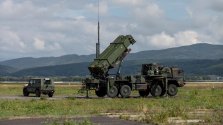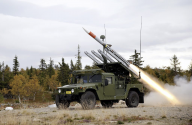South Korea is proceeding with the transfer of hundreds of thousands of artillery rounds for Ukraine, a move that U.S. officials said would make Kyiv’s planned offensive against Russian forces effective and allow the White House to delay a fraught decision about whether to supply cluster munitions banned by many countries.
The decision marks a turnabout by Seoul, which had pledged the artillery in November but then balked at providing lethal assistance, following months of U.S. pleas for help as the Pentagon’s own supply of artillery dwindles.
Under the confidential arrangement, South Korea is transferring the shells to the U.S., which in turn has arranged for them to be sent to Ukraine. The White House declined to comment, as did a South Korean government spokesman in Seoul.
The Pentagon declined to say how the shells are being sent or when the transfer is to be completed, but acknowledged that it has been in discussion with Seoul on buying its ammunition.
South Korea’s contribution of rounds has enabled the Biden administration to delay for now a decision on whether to send cluster munitions—the “dual-purpose improved conventional munition” in Pentagon parlance—to the Ukrainians.
“Cluster munitions would provide a missing piece for the Ukrainian counteroffensive to complement their precision medium-range missiles, tanks and troops,” said Michael O’Hanlon of the Brookings Institution, an independent Washington research organization. “But for those in the administration unready to make that leap, unitary 155 shells would meet some of the same requirements.”
The breakthrough on South Korea’s ammunition supply comes soon after Washington and Seoul issued a joint declaration on security issues during South Korean President Yoon Suk Yeol’s visit to Washington last month, another move to strengthen ties.
Washington first approached the Seoul government last year and asked it to provide artillery for the war in Ukraine. The two sides worked out an initial confidential agreement, but the South Koreans got cold feet after it emerged in the media, according to U.S. officials.
The U.S. has provided more than two million 155mm artillery rounds to Ukraine since the Russian invasion began in February 2022, and its remaining supply has begun to dry up, forcing the U.S. on a global hunt for ammunition. The Pentagon has raided its own stocks of artillery shells at sites in Germany, Israel, Kuwait and South Korea to make up for the shortfall, U.S. and congressional officials said.
Meanwhile, the U.S. has large supplies of cluster munitions, from which the Pentagon could draw if its stocks of regular 155mm shells were to run low, or to augment South Korea’s combat power.
Ukraine has asked for cluster munitions and senior Republican lawmakers have pressed the administration to provide them. U.S. military and defense officials have been sympathetic to Ukraine’s request.
But officials in the White House and State Department have resisted, citing the international opprobrium long attached to the use of cluster munitions.
Fired from an artillery gun or rocket launcher, cluster munitions disperse bomblets that can fall on and kill multiple targets at once.
“It’s very effective against mixed targets, of personnel and equipment, especially when those targets are gathered into dense formations,” Army Gen. Christopher Cavoli, the top North Atlantic Treaty Organization commander, told Congress last month.


